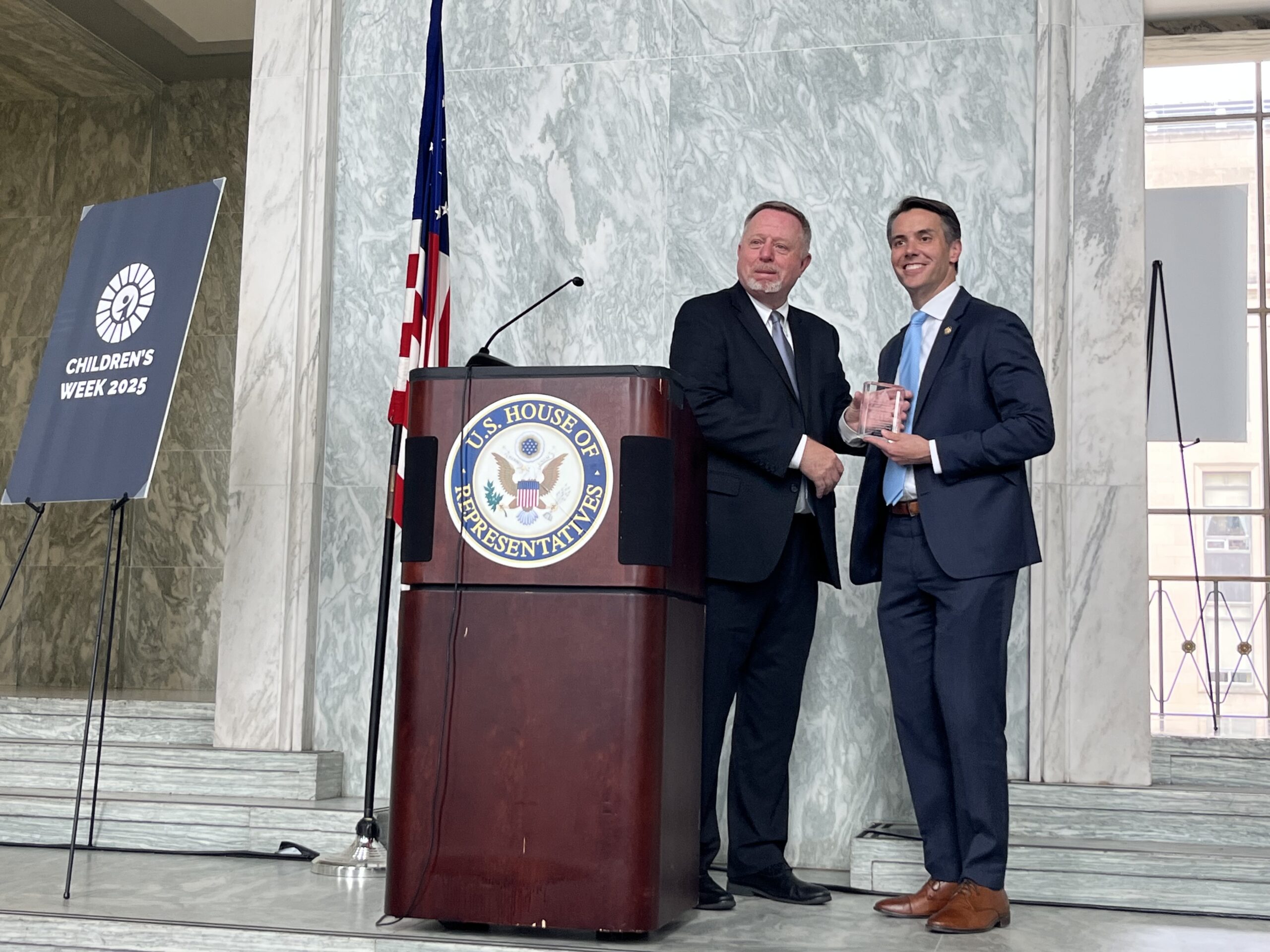
Rep. Morgan McGarvey of Kentucky receives his Champion for Children award from First Focus Campaign for Children President Bruce Lesley at the Children’s Week 2025 kick-off reception.
Happy Children’s Week 2025! We hope you joined some of the briefings and events, which tackled the metrics of early education, investing in foreign assistance for children, and the threats to children contained in the reconciliation package making its way through Congress.
But never fear: Here’s a recap — with links to the recorded sessions — for those who couldn’t join.
BRIEFING: Why Foreign Assistance Matters for Children: Development professionals, advocates and a former refugee highlighted the return on investment that foreign assistance delivers to children and to the world during this online briefing and demanded that Congress restore critical funding and avoid clawing back what’s left of foreign assistance, as requested by President Trump.
These experts also acknowledged that foreign aid must be reformed to better fit the nature of global crises that did not exist when the system was designed, such as climate disasters and online exploitation of children. “We’re not asking for unchecked increases, we’re asking for smart investments with proven return,” said Leila Milani, program director for Global Policy and Advocacy at Futures Without Violence, referencing programs that fight trafficking, child labor, online exploitation and other abuses. “These are targeted tools with measurable results.”
Highlights of this event included conversation with aid workers who were on the ground when U.S. funding screeched to a halt and with a Divine Irakoze, a youth advocate who grew up in a refugee camp in Malawi. Now a student at a U.S. university, Irakoze recalled overcrowded classrooms with very few books, and sitting on stones and under trees to attend class. “They (aid organizations) made a huge difference. They gave us the support we needed, not just to survive but to dream,” she said. “Educated refugees go on to start businesses, lead communities and give back. They are not a burden. They’re actually a blessing.”
Elana Banin, a former policy advisor at International Rescue Committee, and Lauren Murphy, a former senior technical advisor at USAID, shared on the ground experiences of children who are suffering or have died as a direct result of programming halted by the Trump Administration in February. They also outlined the need for reform in foreign assistance and its crucial position as part of U.S. global strategy. “Foreign assistance is not a handout, Banin said. “It is a cornerstone of U.S. strategy.”
Find the recorded webinar at this link.
BRIEFING: Invest in Children: During this briefing in cooperation with the Congressional Dads Caucus and the Congressional Mamas’ Caucus, advocates outlined how the budget reconciliation bill currently in the Senate will disproportionately hurt the nation’s children by cutting the programs that benefit them most. The House-passed bill slashes more than $1 trillion from Medicaid and the Supplemental Nutrition Assistance Program (SNAP), cuts that likely will not change much in the Senate, they said.
Michelle Dallafior, Senior VP Budget and Tax, First Focus Campaign for Children, Abuko Estrada, Vice President, Medicaid and Child Health Policy, First Focus Campaign for Children, and Salaam Bhatti, SNAP Director, Food Research and Action Center (FRAC) said the reconciliation would endanger the health care, food security and economic stability of millions of the nation’s children.
Federal spending on children accounts for just 8.87% of the total U.S. budget, according to Children’s Budget 2024, although children make up 23% of the population. But the programs Congress has targeted disproportionately serve children: 20% of Medicaid funding goes to children, 43% of SNAP funding goes to children, and of course, 100% of CHIP funding goes to children and pregnant women. Cuts to these programs will almost certainly push the share of spending on children much lower. During the first Trump Administration, the president proposed reducing this share to a record low of 7.32%.
Find a summary of the event here. Find the recorded briefing at this link.
BRIEFING: Early Gains, Lifelong Returns – What the Early Childhood Research Shows: Early education provides an economic engine for children, families and the country, experts told the audience at this Capitol Hill briefing, and it cannot succeed without public investment.
“Child care is one of the things that makes all other work possible,” Rep. Suzanne Bonamici (D-OR) said. “There’s no market solution…There has to be investment and to me that’s a good investment. We’re still fighting for that funding.”
A strong body of research going back to the 1960s has found that early childhood interventions reduced crime, improved educational attainment, boosted cognitive development, increased employment, and improved health. The benefits for taxpayers were just as impressive, with $2.50 of savings for every $1 invested due to less need for support later in life. Read Research Confirms that Early Learning Investments Increase Benefits to Children, Lower Costs to Taxpayers.
Georgetown University professor Dr. Anna Johnson presented findings from her School Experiences and Early Development (SEED) study in Tulsa, Okla., which has identified academic and other gains among children who attend universal pre-K.
Dr. Susan Savage, research director of the Los Angeles-area Child Care Resource Center, outlined the cascading impact of subsidized child care, saying that it helps families pay rent, get jobs that give them access to health care, and even escape homelessness.
The Trump Administration’s FY 2026 budget proposal would eliminate several preschool development block grants and a program that helps college students with children afford child care. It would also “flat-fund” the Child Care and Development Block Grant and the Head Start program, leaving investment at FY 2025 levels, which amounts to a cut.
“Flat funding, especially in this current economy, is essentially a cut,” said Casey Peeks, senior director, Early Childhood Policy at the Center for American Progress. “You will see less families receiving subsidies, Head Start teachers unable to get wage increases, and you’ll see Head Start programs close classrooms. “Long-term,” she added, “we want universal, free, birth-through-5 early childhood education. It’s important to call it ‘education’. This is setting kids up for success. If we have a free and universal K-12 system, we should also have free, universal pre-K.”
